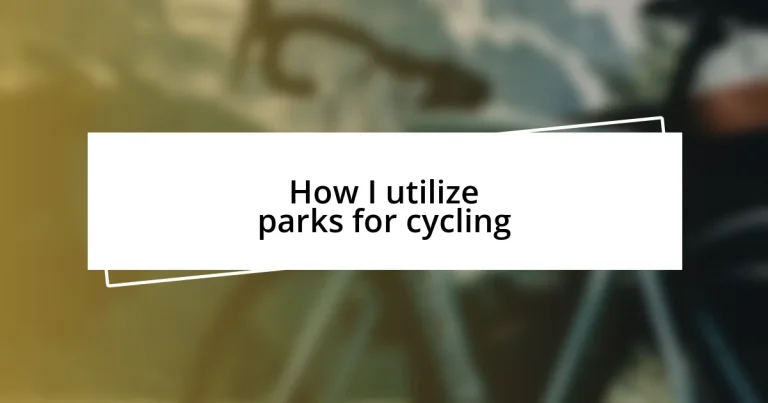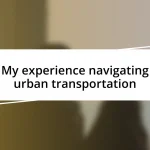Key takeaways:
- Designated cycling paths enhance safety and offer opportunities for exploring beautiful, hidden locations.
- Effective route planning involves using maps and apps for real-time navigation, while considering surface variety and elevation changes.
- Community resources, including local bike shops and online platforms, foster connections among cyclists and improve local cycling conditions through collective efforts.

Exploring designated cycling paths
When I set out to explore designated cycling paths, I always feel a sense of anticipation. There’s something incredibly liberating about knowing I can ride safely without the worry of traffic whizzing by. Have you ever noticed how these paths often wind through beautiful scenery? I frequently find myself pedaling alongside sparkling lakes or through sun-drenched meadows, which only enhances the joy of the ride.
On one particular ride, I stumbled upon a hidden trail that led me to a serene, quiet park I had never visited before. The trees formed a natural canopy overhead, and I could hear the rustling leaves whispering encouragement as I cycled. It’s incredible how exploring these paths can lead to unexpected discoveries, isn’t it? I often wonder how many hidden gems are waiting for us, just off the beaten path.
Utilizing these designated paths not only makes cycling safer, but it also fosters a sense of community. I’ve met fellow cyclists who shared their favorite routes, and each conversation has enriched my experience. Have you ever shared a ride with someone who inspired you? Those moments remind me that cycling is not just about exercise; it’s about connection and finding joy in every journey.

Planning your cycling route effectively
When planning my cycling route, I always start with a map that highlights various parks and paths. I love using apps that provide real-time navigation, making it easy to adjust my route if I need to explore a new area. There’s nothing quite like the thrill of discovering an unexpected shortcut or a peaceful detour.
One of my favorite routes involves a mix of paved paths and shaded trails. I’ve found that alternating between different surfaces not only keeps me engaged but also builds my stamina. During one memorable ride, I took a chance on a rugged trail and was rewarded with breathtaking views of the sunset reflecting off the water. Have you ever felt that rush of excitement when you choose an unplanned route?
Moreover, assessing the elevation changes of a route helps me prepare mentally and physically. I tend to avoid steep hills after a long day at work, as I prefer a leisurely ride rather than a strenuous climb. It’s about knowing my limits while also challenging myself, all while ensuring I enjoy every pedal stroke along the way.
| Considerations | Importance |
|---|---|
| Route Surface | Variety keeps rides engaging |
| Real-time Navigation | Helps in exploring new areas |
| Elevation Changes | Prepares physically and mentally |

Community resources for park cycling
I’ve found that community resources play a pivotal role in enhancing my cycling experience. Local bike shops often organize group rides and workshops that aren’t just about getting help with my bike but also about building relationships with fellow enthusiasts. Have you ever attended a community event that introduced you to new friends or riding partners? I still remember my first group ride; it felt great to share passion and stories while pedaling through our local parks.
Sometimes, I rely on online platforms where cyclists can share their favorite park routes and tips. For instance, I stumbled upon a forum where members provide detailed accounts of their rides through various park trails. One user even shared a hidden picnic spot—how thoughtful is that? These insights not only help in planning my next adventure but also foster a real sense of camaraderie among local cyclists.
Additionally, community engagement initiatives often spearheaded by local government can lead to improved park facilities and cycling paths. I’ve participated in clean-up days and advocacy events, feeling a sense of pride in contributing to the spaces I love. It’s fascinating to think about how our collective efforts can create better cycling environments for everyone, isn’t it?














